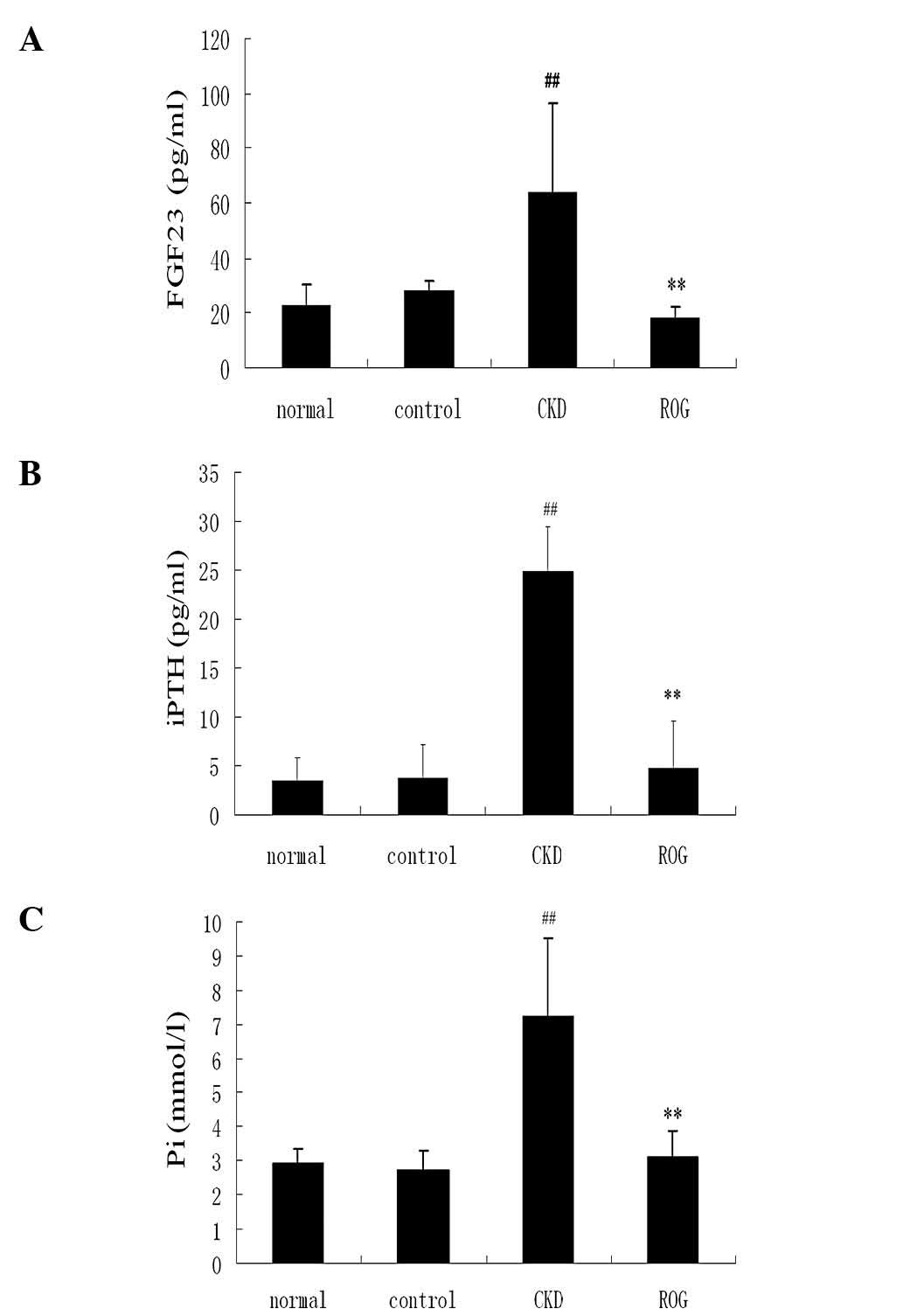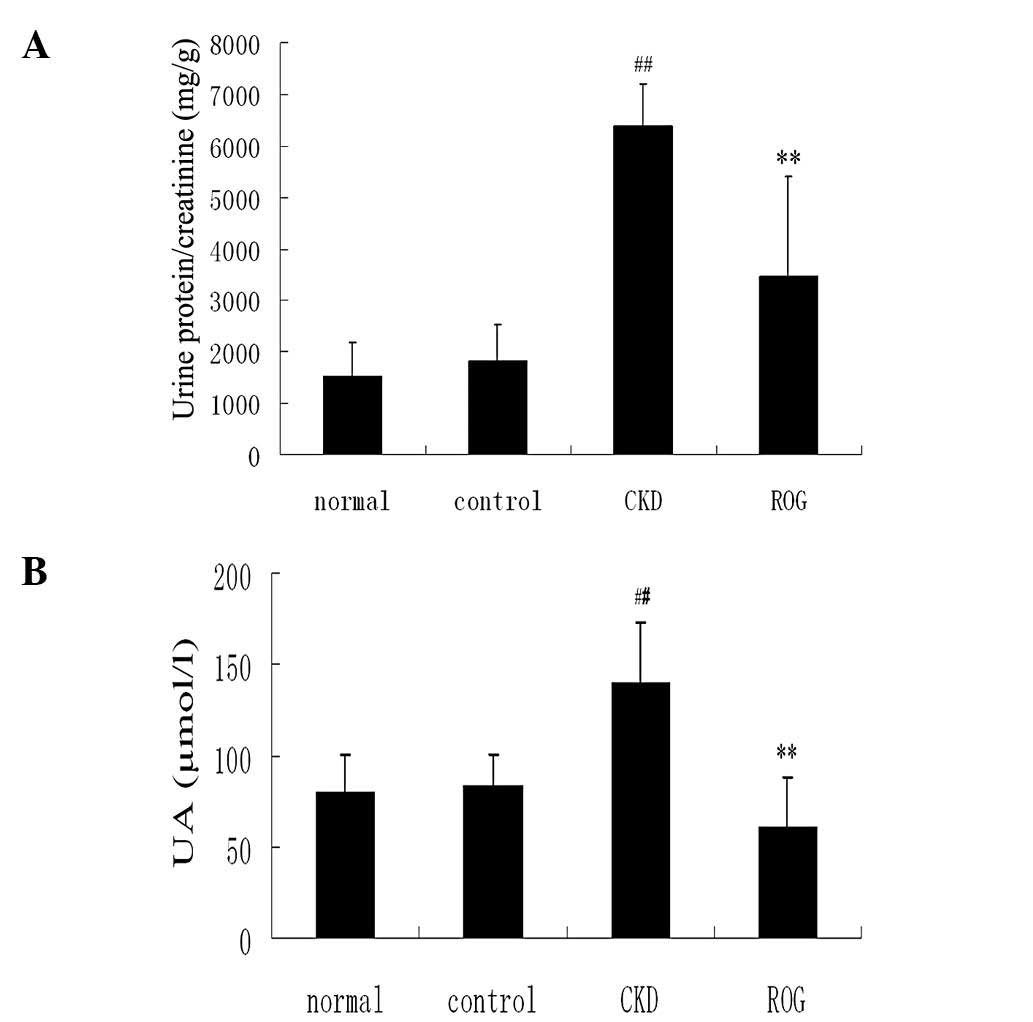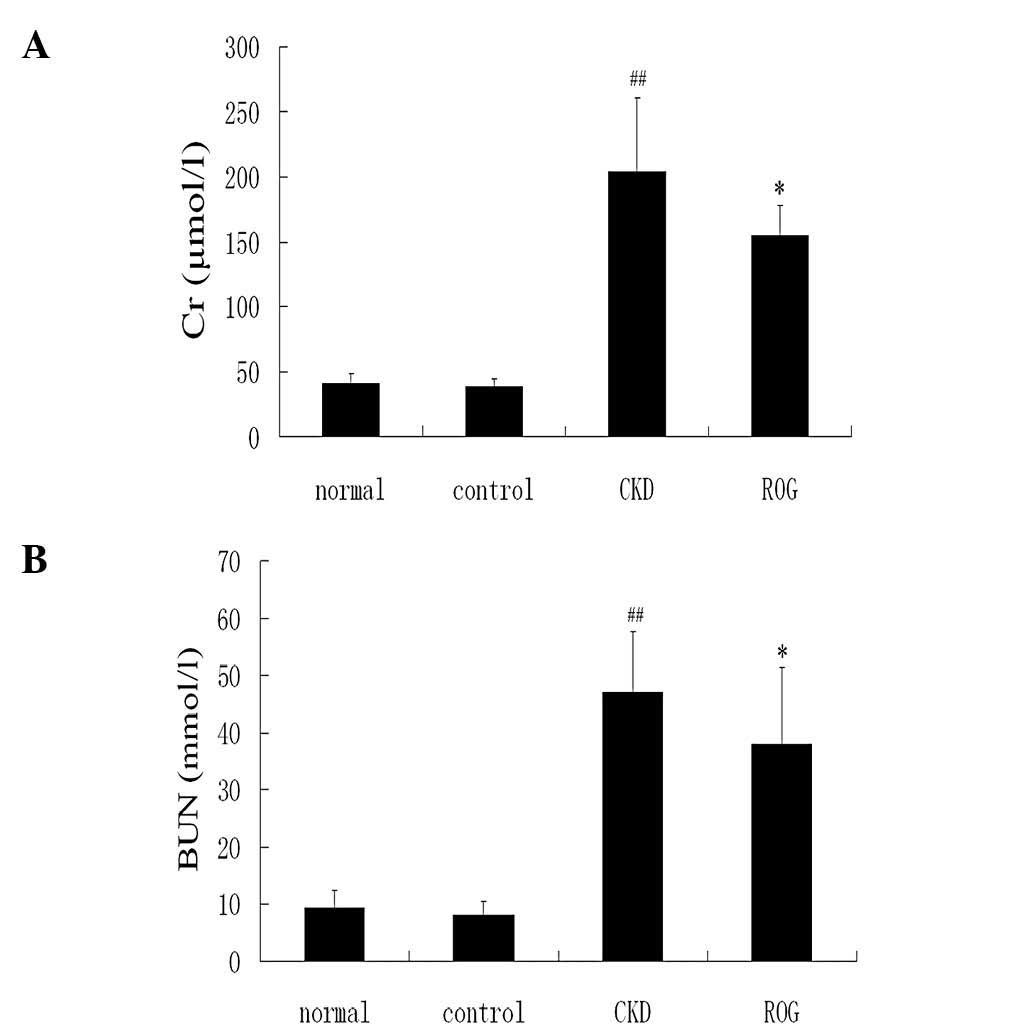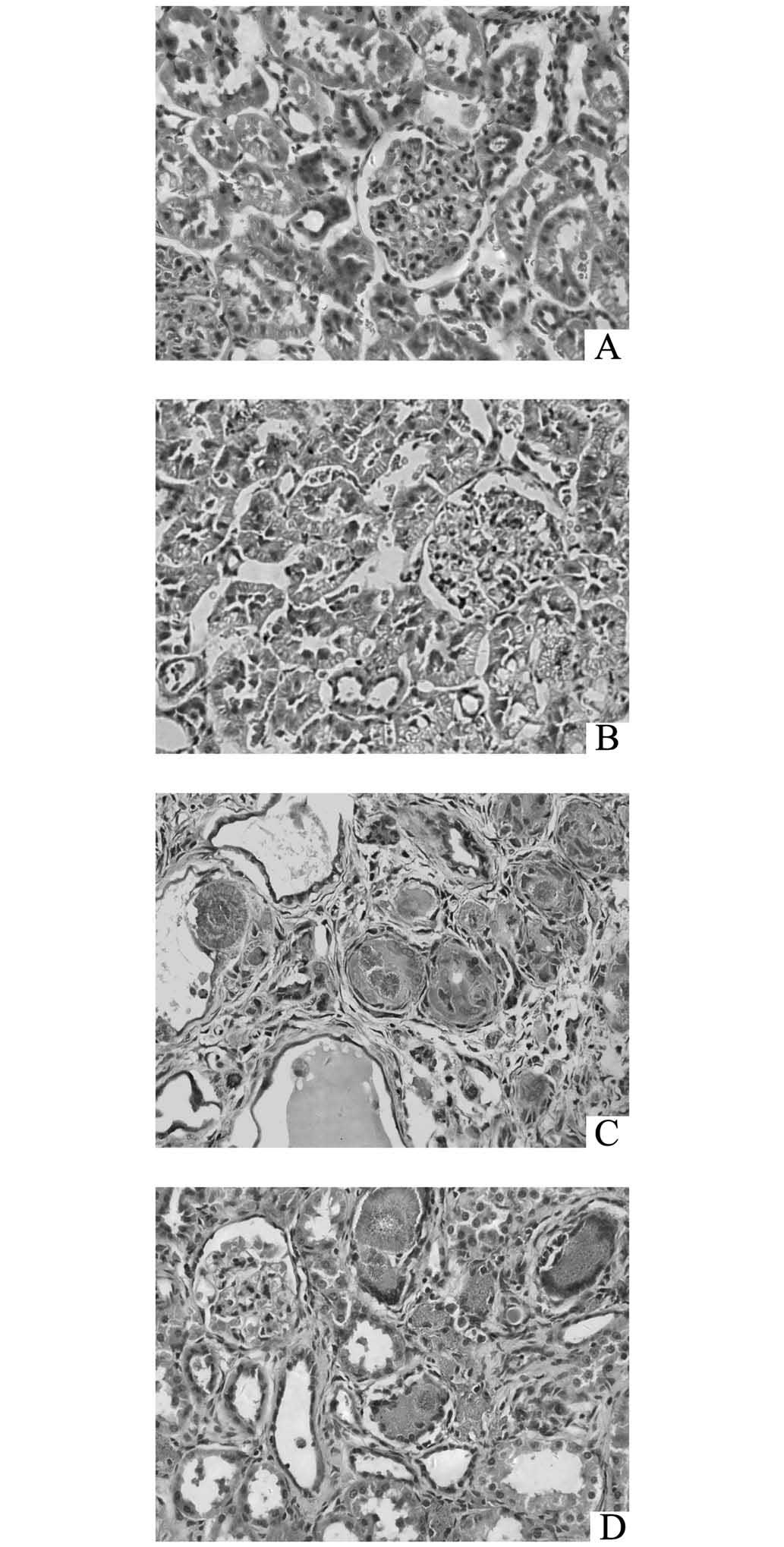|
1
|
Bello AK, Hemmelgarn B, Lloyd A, James MT,
Manns BJ, Klarenbach S, et al: Associations among estimated
glomerular filtration rate, proteinuria, and adverse cardiovascular
outcomes. Clin J Am Soc Nephrol. 6:1418–1426. 2011. View Article : Google Scholar : PubMed/NCBI
|
|
2
|
Sarnak MJ and Astor BC: Implications of
proteinuria: CKD progression and cardiovascular outcomes. Adv
Chronic Kidney Dis. 18:258–266. 2011. View Article : Google Scholar : PubMed/NCBI
|
|
3
|
Faul C: Fibroblast growth factor 23 and
the heart. Curr Opin Nephrol Hypertens. 21:369–375. 2012.
View Article : Google Scholar : PubMed/NCBI
|
|
4
|
Nakano C, Hamano T, Fujii N, Obi Y, Matsui
I, Tomida K, et al: Intact fibroblast growth factor 23 levels
predict incident cardiovascular event before but not after the
start of dialysis. Bone. 50:1266–1274. 2012. View Article : Google Scholar : PubMed/NCBI
|
|
5
|
Razzaque MS and Lanske B: The emerging
role of the fibroblast growth factor-23-klotho axis in renal
regulation of phosphate homeostasis. J Endocrinol. 194:1–10. 2007.
View Article : Google Scholar : PubMed/NCBI
|
|
6
|
Shimada T, Kakitani M, Yamazaki Y,
Hasegawa H, Takeuchi Y, Fujita T, et al: Targeted ablation of Fgf23
demonstrates an essential physiological role of FGF23 in phosphate
and vitamin D metabolism. J Clin Invest. 113:561–568. 2004.
View Article : Google Scholar : PubMed/NCBI
|
|
7
|
Seiler S, Heine GH and Fliser D: Clinical
relevance of FGF-23 in chronic kidney disease. Kidney Int Suppl.
76:S34–S42. 2009. View Article : Google Scholar : PubMed/NCBI
|
|
8
|
El-Abbadi MM, Pai AS, Leaf EM, Yang HY,
Bartley BA, Quan KK, et al: Phosphate feeding induces arterial
medial calcification in uremic mice: role of serum phosphorus,
fibroblast growth factor-23, and osteopontin. Kidney Int.
75:1297–1307. 2009. View Article : Google Scholar : PubMed/NCBI
|
|
9
|
Gutiérrez OM, Mannstadt M, Isakova T,
Rauh-Hain JA, Tamez H, Shah A, et al: Fibroblast growth factor 23
and mortality among patients undergoing hemodialysis. N Engl J Med.
359:584–592. 2008.PubMed/NCBI
|
|
10
|
Sharma SK, Zou H, Togtokh A, Ene-Iordache
B, Carminati S, Remuzzi A, et al: Burden of CKD, proteinuria, and
cardiovascular risk among Chinese, Mongolian, and Nepalese
participants in the International Society of Nephrology screening
programs. Am J Kidney Dis. 56:915–927. 2010. View Article : Google Scholar : PubMed/NCBI
|
|
11
|
Reel B, Guzeloglu M, Bagriyanik A, Atmaca
S, Aykut K, Albayrak G and Hazan E: The effects of PPAR-γ agonist
pioglitazone on renal ischemia/reperfusion injury in rats. J Surg
Res. 182:176–184. 2013.
|
|
12
|
Basturk T, Unsal A, Ulas T, Koc Y, Sakaci
T, Ahbap E and Borlu F: Effects of rosiglitazone treatment on
insulin resistance and TNF-alpha levels in patients with chronic
kidney disease: a prospective study. Eur Rev Med Pharmacol Sci.
16:1519–1524. 2012.PubMed/NCBI
|
|
13
|
Setti G, Hayward A, Dessapt C, Barone F,
Buckingham R, White K, et al: Peroxisome proliferator-activated
receptor-γ agonist rosiglitazone prevents albuminuria but not
glomerulosclerosis in experimental diabetes. Am J Nephrol.
32:393–402. 2010.
|
|
14
|
Ren L, Liu N, Zhi H, Li Y, Li Y, Tang R,
et al: Vasculoprotective effects of rosiglitazone through
modulating renin-angiotensin system in vivo and vitro. Cardiovasc
Diabetol. 10:102011. View Article : Google Scholar : PubMed/NCBI
|
|
15
|
Alessi A, França Neto OR, Prim C, Silva
RF, Noronha Ld, Brofman PR, et al: Rosiglitazone and vascular
injury in hypercholesterolemic rabbits: neointimal formation
assessment. Arq Bras Cardiol. 95:283–288. 2010.PubMed/NCBI
|
|
16
|
Nakaya H: Roles of PPARgamma in preventing
the development of atherosclerosis in LDL receptor null mice. Nihon
Rinsho. 68:229–234. 2010.(In Japanese).
|
|
17
|
Schiffrin EL: Peroxisome
proliferator-activated receptors and cardiovascular remodeling. Am
J Physiol Heart Circ Physiol. 288:H1037–H1043. 2005. View Article : Google Scholar : PubMed/NCBI
|
|
18
|
Hu W, Yu Q, Zhang J and Liu D:
Rosiglitazone ameliorates diabetic nephropathy by reducing the
expression of Chemerin and ChemR23 in the kidney of
streptozotocin-induced diabetic rats. Inflammation. 35:1287–1293.
2012. View Article : Google Scholar : PubMed/NCBI
|
|
19
|
Bergwitz C and Jüppner H: Regulation of
phosphate homeostasis by PTH, vitamin D, and FGF23. Annu Rev Med.
61:91–104. 2010. View Article : Google Scholar : PubMed/NCBI
|
|
20
|
Pontoriero G, Cozzolino M, Locatelli F and
Brancaccio D: CKD patients: the dilemma of serum PTH levels.
Nephron Clin Pract. 116:c263–c268. 2010. View Article : Google Scholar : PubMed/NCBI
|
|
21
|
Levin A, Djurdjev O, Beaulieu M and Er L:
Variability and risk factors for kidney disease progression and
death following attainment of stage 4 CKD in a referred cohort. Am
J Kidney Dis. 52:661–671. 2008. View Article : Google Scholar : PubMed/NCBI
|
|
22
|
Kincaid-Smith P, Fairley KF, Farish S,
Best JD and Proietto J: Reduction of proteinuria by rosiglitazone
in non-diabetic renal disease. Nephrology (Carlton). 13:58–62.
2008. View Article : Google Scholar : PubMed/NCBI
|
|
23
|
Betz B, Schneider R, Kress T, Schick MA,
Wanner C and Sauvant C: Rosiglitazone affects nitric oxide
synthases and improves renal outcome in a rat model of severe
ischemia/reperfusion injury. PPAR Res. 2012:2193192012. View Article : Google Scholar : PubMed/NCBI
|


















